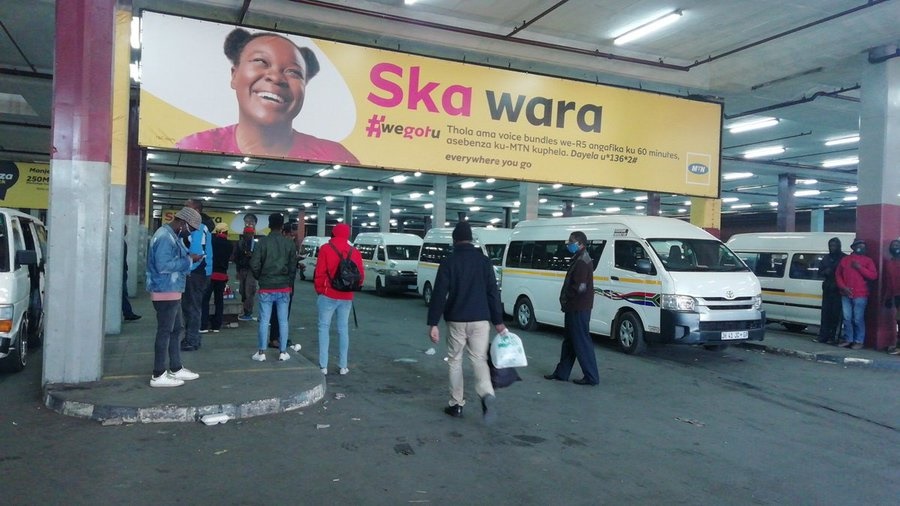


A view of Bree Taxi Rank during the strike.
- Hundreds of taxi drivers went on strike in Gauteng on Monday, which left thousands stranded.
- Taxi associations are protesting the state’s R1 billion relief package, saying it is simply too little.
- Here’s what you need to know about what led to the taxi strike.
Thousands of South Africans were stranded on Monday morning when the South African National Taxi Council (Santaco) embarked on a strike in Gauteng to protest government’s R1.135 billion relief package for the industry.
The Department of Transport has offered taxi owners R5 000 each in relief, to be distributed by the South African Revenue Service (SARS), due to the impact of Covid-19 and the national lockdown, but taxi owners have called for R20 000 each.
In Gauteng, roads were blockaded, commuters were reportedly pulled off buses and motorists intimidated as taxi owners tried to voice dissatisfaction with the relief package.
In an interview with 702, Transport ministry spokesperson Ayanda-Allie Paine said the strike was premature.
Here’s what you need to know about why taxis started striking in Gauteng.
Why taxis are calling for a relief package
Santaco national spokesperson Thabiso Molelekwa said taxi owners across South Africa have been hard hit by the national lockdown, being forced to operate at 70% capacity and barred from travelling interprovincially.
This has led to fears that taxi owners will not be able to make their vehicle loan repayments from 1 July, when the payment holiday period granted in March will end.
Santaco estimates 45% of taxi owners could have their vehicles repossessed in the next six to eight months, and the industry is losing around R25 million per day due to Covid-19.
Molelekwa said taxi owners have been struggling to make enough money to cover fuel costs and the situation has been compounded by the continued increasing impoundment of taxis during the lockdown.
Meanwhile, the National Taxi Alliance (NAT) has said its members should increase fares by not more than 40% due to lower load factors in light of Covid-19, and increasing costs for personal protective gear and sanitation.
The taxi industry has called for regulation reviews and wants 100% passenger capacity to be brought back.
The South African taxi industry generates more than R40 billion annually with anything between 250 000 and 300 000 taxis creating roughly 350 000 direct and indirect job opportunities, including drivers, rank marshals and other administrative support staff.
What the South African government offered
On Friday, Transport Minister Fikile Mbalula revealed a R1.135 billion relief package for the taxi industry – the largest relief package for a single subsector of government in South Africa during the pandemic.
Mbalula said most sectors only received R350 million in support, and reaching the agreement with government required extensive lobbying and convincing as funds are extremely limited.
He said the administration of the relief fund by SARS will help achieve the long-term sustainability of the industry through formalisation and, ultimately, subsidisation.
Mbalula said he is aware of calls to increase taxi capacity to 100%, and to allow interprovincial travel, but this required consultation with the National Coronavirus Command Council (NCCC).
The taxi industry is currently operating at less than 60% of its fleet size, and is transporting 30% less than its licensed carrying capacity, the minister said. “Almost 20% or more of the taxi industry experienced [a] total loss of income.”
He said the taxi industry is the largest carrier of passengers in South Africa, transporting around 5.4 million people daily.
The fallout since
Shortly after Mbalula’s announcement, Santaco in Gauteng vowed to shut down operations from Monday as a protest against the relief package announced.
Santaco’s Molelekwa described the relief package as a “slap in the face”, and insufficient as it must be shared between taxi operators, metered taxis and e-hailers.
On Saturday, Mbalula, who urged taxi associations to not shut down, admitted the decision to avail R1.135 billion to the industry as relief support was “too little” to compensate for the lockdown, but said government did not have more money to give.
Mbalula appealed to taxis to continue to operate as “our economy is falling apart”.
On Monday morning, thousands of commuters were left stranded in Gauteng, and motorists and commuters were reportedly intimidated.
Speaking to 702 on Monday morning, Molelekwa condemned the intimidation, and said representatives were sent to regional leaders to tell them “this is not helping, this is not how you express dissatisfaction”.
Molelekwa said taxi operators initially mandated Santaco to negotiate for about R20 000 per taxi, but acknowledged this could “probably be too much”. He added that the R5 000 offered, however, was “far” from an acceptable offer.
He furthermore objected to SARS distributing the relief funds instead of associations as this would “conflate the process”, adding that by the time this “tedious” action was done “vehicles would have been repossessed”.
Santaco and NAT are both scheduled to meet with Mbalula by Wednesday.

